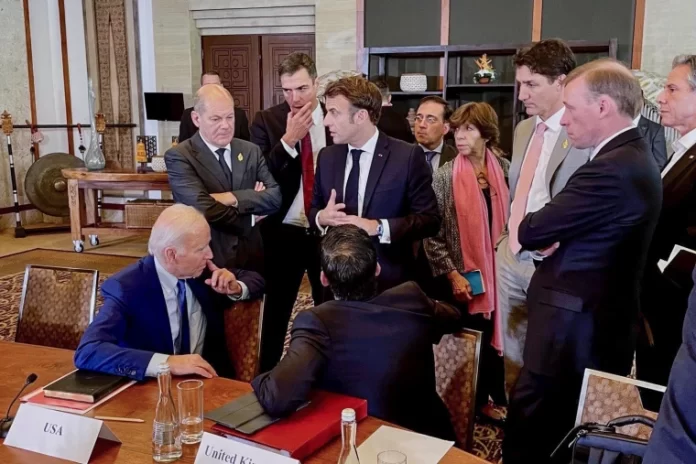On Tuesday, a “Russian-made” missile struck Nato-member Poland. Two people were killed in the blast. For the first time, a Nato country has been directly hit during the nine-month Russia-Ukraine war. It is still unclear who fired the missile.
The G-7 and Nato leaders, during the G20 summit in Bali, held an emergency meeting after the blast. The summit had earlier deplored the war in Ukraine “in the strongest terms”.
The United States and its Nato allies are probing the blast, but initial information suggests it may not have been caused by a missile fired from Russia, US President Joe Biden said.
The missile that hit Poland was probably a Ukrainian air defence missile and there was no evidence to suggest the incident was an intentional attack by Russia, Poland’s President Andrzej Duda said late on Wednesday.
Soon after the blast, the G-7 and Nato leaders, during the G20 summit in Bali, held an emergency meeting. The summit had earlier deplored the war in Ukraine “in the strongest terms”.
Biden pointed out that the US will back the investigation by Poland into the recent missile strike. “And then we’re going to collectively determine our next step as we investigate and proceed. There was total unanimity among folks at the table”. Germany, Canada, Netherlands, Japan, Spain, Italy, France and the United Kingdom were also at the meeting. Ukraine is not a Nato member, even though it has been getting external support from the US and the West.
If it is proved that Russia fired the missile, Nato’s principle of collective defense, known as Article 5, could be invoked by its members and could follow an armed response.
Article 5 — which has been invoked only once after the 9-11 attacks on New York — states that an armed attack against one member will be deemed an attack against them all, paving the way for a military response.
As pressure mounted on Russia, its defense ministry denied that its missiles hit Polish territory, dubbing reports as “a deliberate provocation aimed at escalating the situation”.
The Russian mission at the United Nations on Wednesday said “the incident in Poland is an attempt to provoke a direct military clash between Nato and Russia”.
Poland has said it would increase its military readiness and was contemplating the activation of Article 4 of the Nato Treaty – which means it can bring security issues to the group’s table.
GROWING CONCERNS
The Polish missile strike has triggered mounting fears that the Russia-Ukraine could spill over to other countries. And Poland could just be the start. From Poland, it could spread to Belarus, Romania and Hungary.
Apart from the economic costs of the Russia-Ukraine conflict, there are humanitarian costs involved too. The war has resulted in the biggest refugee crisis in Europe since World War II. The crisis started in February this year when the war escalated. By late May, over 7.8 million refugees had fled Ukraine while 8 million people had been displaced within the country. Around 90% of these refugees are women and kids.
READ ALSO: Food insecurity: Ukraine grain deal dominates food security debate at G20
Poland has already raised alarm over Russia trying to redefine boundaries by force. It has a history of hostility with Russia. There are Nato troops stationed on the eastern regions of Poland. The recent missile attack in Poland should be a wake-call.
Most world leaders have condemned the blast, and will now take steps so that such a thing doesn’t happen again. Because if it does, it would be difficult to prevent more spillovers of war – which could wreak more havoc.
It was earlier reported that, A missile struck an eastern Polish village near the border with Ukraine, killing two people. Poland’s president said there was no evidence that the strike was intentional. Preliminary U.S. assessments indicated it was from a Ukrainian air-defense system, according to two senior Western officials.
Still, NATO officials and Ukrainian politicians say that Russia was ultimately responsible for the incident because of its invasion of Ukraine.
North Atlantic Treaty Organization ambassadors held an emergency meeting to discuss the missile incident and to coordinate the alliance’s next moves.
Original Post













